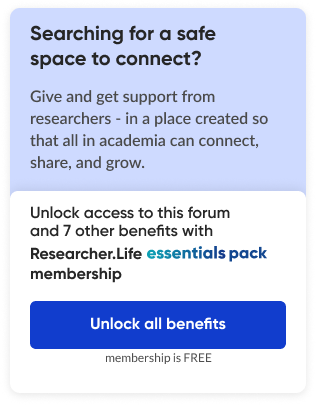Do you feel truly supported in academia? 14 Researchers share their experiences

Editor’s note: This article includes the responses shared by participants of a global survey on mental health in academia. Given the relatively delicate and private nature of the topic, a few respondents have chosen to share their experiences anonymously. To maintain the authenticity of the original comments, we have retained certain grammatical errors. Please bear in mind that not all of these researchers have English as a first language.
On World Mental Health Day 2019, Editage Insights’ parent organization Cactus Communications launched a global survey on mental health, fulfilment, and wellbeing among researchers. Over 10,000 researchers have participated so far, sharing joy and stress triggers in their lives, the kind of changes they’d like to see in the global research culture, and the kind of support they’d like to receive from academic institutions and organizations. Some of these participants have also chosen to get further involved by sharing personal stories and experiences with us, shedding more light on the real-life situations encountered by researchers and academics.
Of the many topics we discussed, one dealt with the kind of support these researchers have in their work environment, or the lack thereof. We specifically wanted to know whether they were happy or dissatisfied with the kind of support they were receiving, and also if working with a supportive supervisor/mentor had enhanced their work experience.
We’ve specially curated some of the responses in this round-up. While some of these experiences are positive and heart-warming, some others are relatively disheartening and reflects rather poorly on the existing research environment.
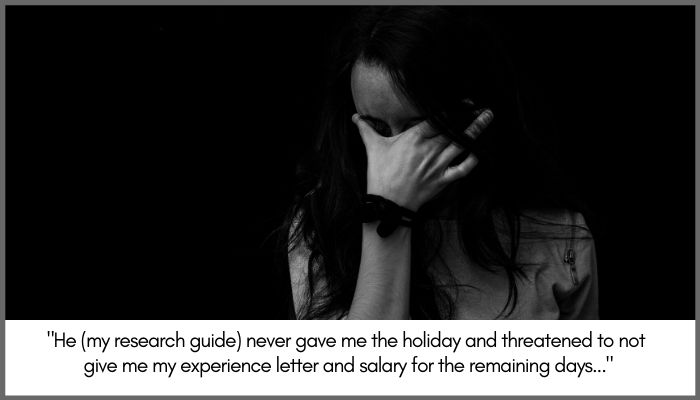
"I have had one year of research experience at a research institute in Goa (India). Throughout my year I had a very toxic guide, who probably due to past scenarios was initially very respectful, (but later) began to take advantage of situations. One such situation that made (me) extremely unhappy was when I asked for a holiday and he responded very badly... I shivered, but was ready for the worst. He came and stood in front of me to provoke me. But I kept on asking for my holiday. He never gave me the holiday and threatened to not give me my experience letter and salary for the remaining days… I am genuinely happy I have left that place, but he still keeps holding up my publication which was a fruit of mutual work. I don’t think I will get it but it doesn’t matter now. However, I think funding agencies (should) make psychological screening a COMPULSORY part of the intake process (for supervisors) in a research institute." – Anonymous
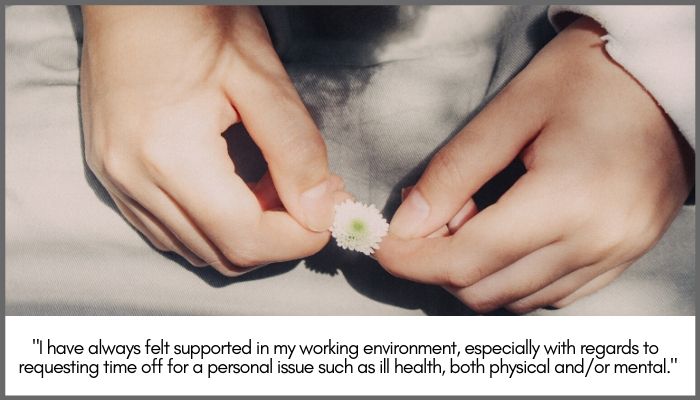
"I have always felt supported in my working environment, especially with regards to requesting time off for a personal issue such as ill health, both physical and/or mental. However, I have seen other PhD students insufficiently supported surrounding issues such as sexism and abuse of power in the work place." – Anastasia Doronina, PhD candidate, Civil Engineering, University of Sheffield
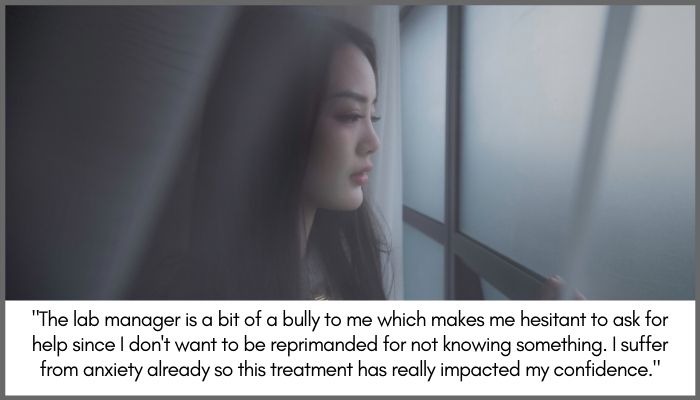
"I don't feel well supported at my institution. Not by my PI or lab supervisor, nor by the administrative staff who are ostensibly there to advocate for students. I don't think that my labmates see mental health issues as 'real' health problems. The lab manager is a bit of a bully to me which makes me hesitant to ask for help since I don't want to be reprimanded for not knowing something. I suffer from anxiety already so this treatment has really impacted my confidence. On a related note, I've always preferred to work in the afternoons/evenings. So, once I had this added anxiety about being in the lab with other people, it really made sense for me to work during 'off' hours. This also makes sense from a practical standpoint because there is a high demand for certain equipment during the day. It's also cheaper to book equipment in the off-hours. I mention all of this because the lab manager seems to think I am lazy and not motivated. He also scolded me for not asking him where my cells were being stored despite him never telling me that he took my cells in the first place. I don't think he is being like this on purpose, but it feels like gaslighting and points to a larger problem of ignorance in the senior lab staff about what it is like to be a student." – Anonymous
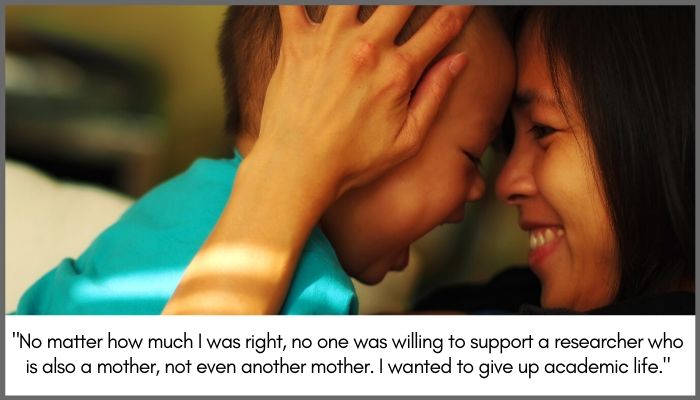
"I was a postdoctoral fellow when my son had an accident and I had to take him to the hospital. I had to cancel the next day's appointments to stay with him. When I returned, a doctoral student – older than me and without children – shouted at me with great fury. In her point of view, it was absurd to cancel academic commitments because of my son. Our advisor, leader of the research group who is also a mother, was there and saw the whole situation and she said nothing, just abstained. When the doctoral student left, the advisor said that I was right, but that there was nothing she could do for me. I felt awful. No matter how much I was right, no one was willing to support a researcher who is also a mother, not even another mother. I wanted to give up academic life." – Anonymous
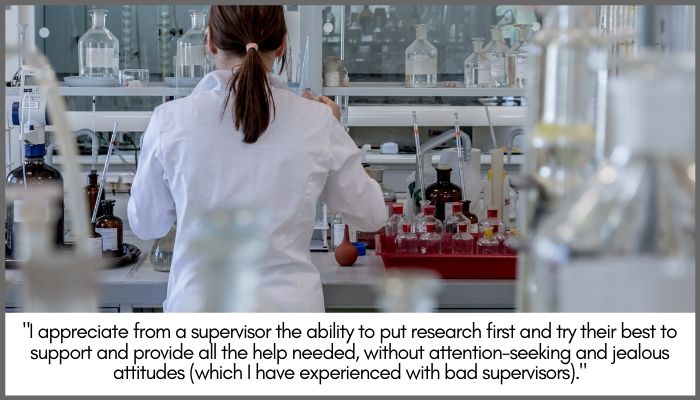
"The qualities I found most helpful in a supervisor where, first of all, the faith they have in my and my work; this creates a positive and supportive atmosphere where every person is valued. Second, I appreciate from a supervisor the ability to put research first and try their best to support and provide all the help needed, without attention-seeking and jealous attitudes (which I have experienced with bad supervisors)." - Daina Romeo, PhD candidate
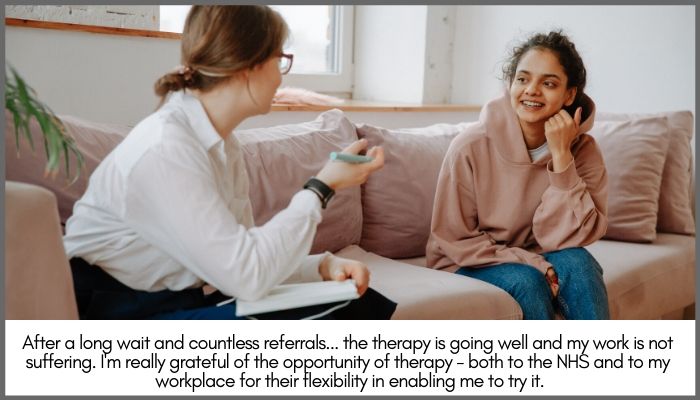
"Following a long wait and countless referrals, I was finally offered twice weekly psychoanalytic psychotherapy for two years. The only problem was that the sessions would have to take place during the working day - I thought there was no possibility of fitting it in around my work as a laboratory scientist. After discussion with my line manager, we realised that it should be possible to plan experiments around this and my line manager agreed to let me try and see whether it could work. I felt that it was a huge ask to request to disappear for 2-3 hours (including travel time) twice a week and was surprised that no negotiation was really required - my line manager was perfectly happy to try it. I think we have found a workable solution: the therapy is going well and my work is not suffering. I'm really grateful of the opportunity of therapy - both to the NHS and to my workplace for their flexibility in enabling me to try it." – Anonymous
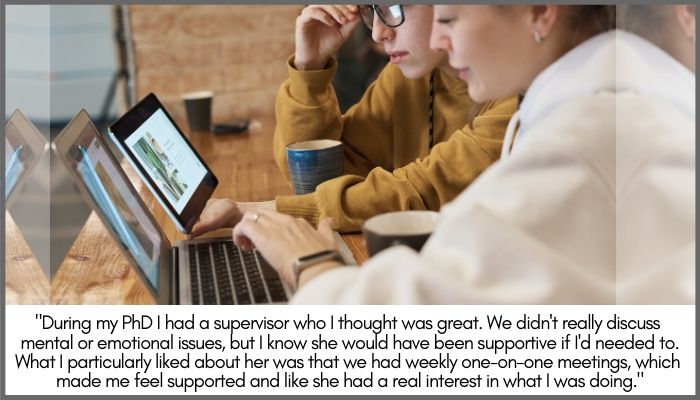
"During my PhD I had a supervisor who I thought was great. We didn't really discuss mental or emotional issues, but I know she would have been supportive if I'd needed to. What I particularly liked about her was that we had weekly one-on-one meetings, which made me feel supported and like she had a real interest in what I was doing. She expected a lot of me but without being pushy. She was not a micromanager, so it made me feel like I was trusted to get the work done on my terms, without someone hovering over me. My research projects were ultimately led by her, but she gave me freedom to direct the projects and design experiments in my own way, which gave me a sense of ownership and made me feel trusted and capable. Also what is very important is that whenever I told her that I was sometimes working long hours and weekends in the lab, instead of being happy about this (as my postdoc supervisor was), she made comments that I shouldn't make this kind of work structure a regular habit, in order to give me work-life balance. Unfortunately this is extremely rare behavior for research supervisors! Another positive is that in the final year of my PhD, our weekly meetings started to focus on my future goals, and we had some really good discussions about what direction I wanted to go in, and how she could help me to get there." – Anonymous
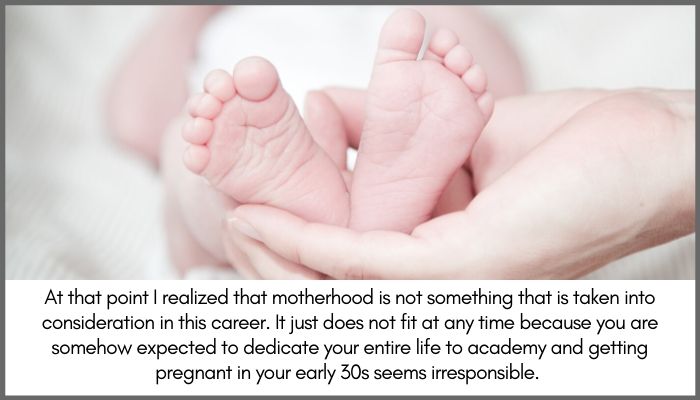
"I decided to continue with my graduate studies and ended up getting pregnant before finishing my thesis. At that point I realized that motherhood is not something that is taken into consideration in this career. It just does not fit at any time because you are somehow expected to dedicate your entire life to academy and getting pregnant in your early 30s (the time around which female fertility starts to decline) seems irresponsible. It turned out that my daughter was the only child I ever got and, noticeably, many of my current female PhD workmates tell me that they made the responsible decision of not having children to continue with their careers. From an evolutionary perspective, it is like saying that we negatively select the smartest women out of future generations. Does that make any sense?" – Anonymous

"The problem is, there is no support! There is no institutional support whatsoever - that is my experience from the Czech academic environment. When I was finishing my PhD, my relationship with my supervisor was extremely difficult - in retrospect, I think some of the things she did could be probably labeled as abuse (psychological). There was literally no one that I could talk about it. I talked to people I knew, even my supervisor's colleagues and they all said that they know she is really difficult and her behaviour is probably not okay, but these were informal conversations with people who were my friends. I couldn't think of anyone that I could go to, to try to solve the issue. I was terrified, because I knew that if I openly complained about her, it would probably just make my position more difficult. I could significantly lower the chances of successfully submitting and defending my PhD thesis in the end. I talked to my therapist, she helped me to deal with it. I finished my PhD thesis and left the university and never talked to my supervisor again. I still don't know to whom I could talk, at least to raise awareness, to prevent this from happening to other people – there are no formal support structures at the university, there is no 'safe space.'" – Anonymous

"Six months prior to the birth of my first child, I spoke to my PI about taking parental leave (I was a male PhD student). He told me that he knew I was lazy and using this as an excuse to get out of work but that he would "generously" offer me 7 calendar days of paid leave and expected me back on time on day 8. No excuses would be accepted since I was expendable and could be replaced immediately." – Anonymous
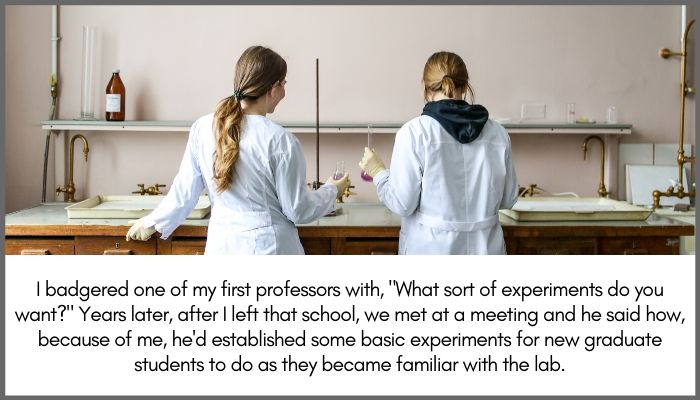
"I have almost never had any active support. That doesn't mean everyone was out to get me. Merely the people who probably should have supported me (bosses, professors, colleagues) had no idea how to be supportive, how to teach, mentor, lead, guide, etc. and were completely self-centered on their own stresses and problems. One of my favorite, and horribly common examples, is the professor greeting a new graduate student with a sheaf of manuscripts and saying, ‘Here, read these and do some experiments.’ Now that's really showing someone the ropes! I badgered one of my first professors who did this with, ‘what sort of experiments do you want?’ Years later, after I left that school, we met at a meeting and he said how, because of me, he'd established some basic experiments for new graduate students to do as they became familiar with the lab." – Helen Miller, retired scientist
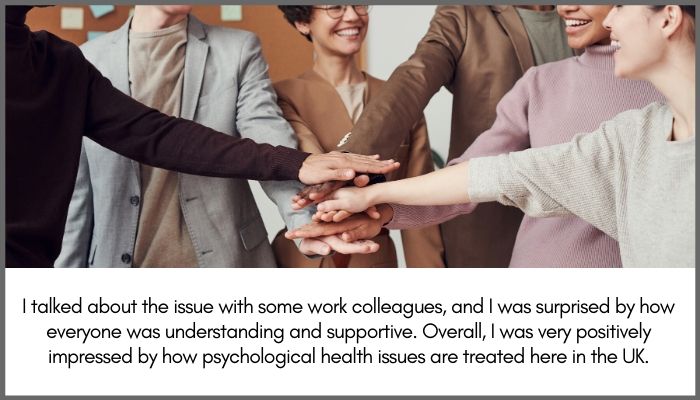
"Last autumn I found myself struggling in my personal and, partially, professional life because of several factors. I had been in the UK for four months at the time, and I did not know that many people. I wanted to seek psychological support to cope with the situation, but I did not know where to start because I have never dealt with the public health system in the UK. I talked about the issue with some work colleagues, and I was surprised by how everyone was understanding and supportive. Overall, I was very positively impressed by how psychological health issues are treated here in the UK, because I was used to a very different approach in Italy: sometimes it feels like we sweep all things "mental" under the rug and do not consider them as real and noteworthy as physical issues. Moreover, even though I had been with the research group for only a few months, they almost felt like a family; I was able to share my struggles with them and I received (and still receive) invaluable advice and support."— Marta Mangiarulo (@Marta_Mang), Department of Neuroscience, Psychology and Behaviour, University of Leicester.
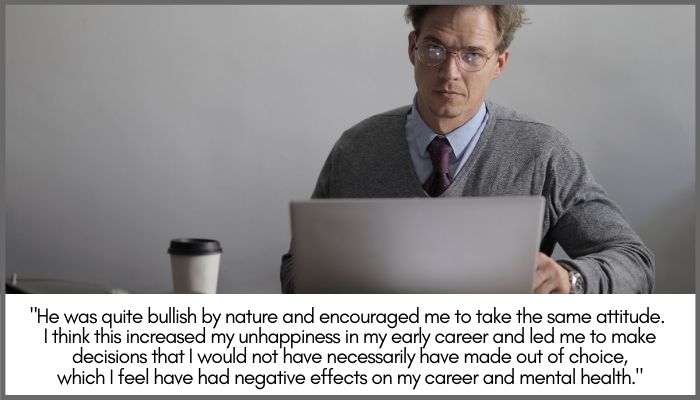
"I did have a mentor, who was my PhD supervisor, and with whom I continued to work till he retired a few years ago. However, I am not sure it was an overall positive experience. He was quite bullish by nature and encouraged me to take the same attitude. I think this increased my unhappiness in my early career and led me to make decisions that I would not have necessarily have made out of choice, which I feel have had negative effects on my career and mental health." – Anonymous
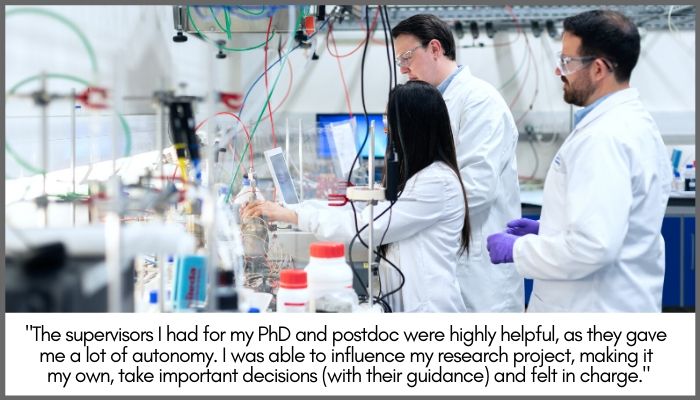
"The supervisors I had for my PhD and postdoc were highly helpful, as they gave me a lot of autonomy. I was able to influence my research project, making it my own, take important decisions (with their guidance) and felt in charge. In a negative relationship I had with another postdoc supervisor, the opposite was the case; I had the feeling I had no control and wasn't alone to make my own decisions, only had to follow my supervisors lead, not being able to bring in ideas, which finally led me to change supervisors." – Laura Weiss (@LauraAnneWeiss)
As you read in the experiences shared above, while there are institutions and supervisors who have provided and continue to provide the right kind of support, there are the unsupportive kind as well. So although some researchers have been fortunate enough to work in supportive environments, the truth remains that there are many in academia who are unsupported and surrounded by negativity and a toxic work environment. However, a supportive work environment shouldn’t be something that’s left up to chance. Hopefully, together we can make those who are aloof, reflect and bring about the necessary changes to make academia more nurturing and inclusive.
Did any of these experiences resonate with you? If you feel comfortable talking about some of your own experiences in academia, we’d love to hear you and help you share your story with other researchers. If you’d like to share your story with us, please write to us at insights@editage.com.
The Cactus Foundation survey on mental health in academia is still running, but is set to close soon. If you haven’t taken the survey yet, don’t miss this final chance to make your voice count. You can participate by clicking on this link here.
Comments
You're looking to give wings to your academic career and publication journey. We like that!
Why don't we give you complete access! Create a free account and get unlimited access to all resources & a vibrant researcher community.






